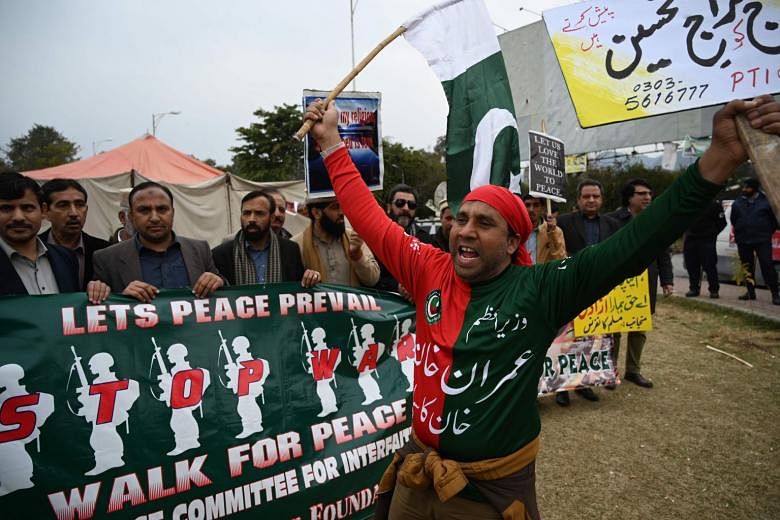Passions are running high in Pakistan although there seems to be little appetite for war as tensions with India soar over Kashmir.
Prime Minister Imran Khan's decision to release the captured pilot of an Indian air force plane, just hours after his aircraft was downed, was widely hailed in the Pakistani Parliament by all political parties, including hardliner Islamists, and the people as a "noble act" and display of "real statesmanship".
Pakistanis also took to social media with the hashtag #SayNoToWar to echo the message of peace.
But jingoism was apparent in demonstrations in multiple cities staged by political parties, the business community and university students.
Those taking part chanted slogans against India for pushing the region into a war-like situation, and expressed solidarity with the Pakistan Prime Minister as well as the country's armed forces.
Pakistan Air Force squadron leader Hassan Siddiqui, who has been credited with shooting down two Indian jets, was hailed as a "national hero" on social media, with users widely sharing his videos and photos.
Some locals also gathered outside his home in Karachi, carrying flowers and the national flag. They also chanted slogans of "Pakistan Zindabad" (Long Live Pakistan).
Meanwhile, the captured Indian pilot, in a video aired on state media, thanked the Pakistani army for rescuing him from an angry mob and described the army officials as "thorough gentlemen".
Said teacher Salma Khalid, who lives in Islamabad: "This shows the professional attitude of our army who even treats enemies with respect."
Analysts in Pakistan believe the tense situation is being "orchestrated" by Indian Prime Minister Narendra Modi and his ruling Bharatiya Janata Party to ensure their victory in the parliamentary election next month and in May.
"War hysteria and anti-Pakistan sentiments are the only thing that can help Mr Modi and the BJP earn votes in the upcoming elections due to their economic failures. Secondly, the Indian move is designed to enhance its military budget and to boost the domestic military industry," Dr Zafar Nawaz Jaspal, professor of international relations at Quaid-e-Azam University, told The Straits Times.
Many also compared the media coverage of the tensions on both sides of the border, lauding what they say is the responsible coverage of mainstream Pakistani media and criticising the war hysteria among Indian media.
"Anyone who has analysed Indian media in the current conflict would feel as if Indian media is the official spokesman of the Indian government and army. On the other hand, international journalists find a diversity of opinion in Pakistan where media has largely remained neutral," commented Pakistani journalist Ahmed Quraishi.
Pakistani media urged both nuclear-armed countries to take steps towards de-escalating the crisis.
In an editorial entitled "Aiming for peace", published on Thursday, the leading newspaper Dawn asserted: "India and Pakistan should immediately cease hostilities; the international community should urgently intervene diplomatically; and at all costs, war between India and Pakistan must be avoided."
It added that tensions could lead to "unthinkable conflict and destruction".
The editorial of another major daily, The News, reiterated that amid the tensions it should not be forgotten that "the future of Kashmir is the key to this region's peace. Any decision must be made according to the will of the Kashmiri people".
Prime Minister Khan's farsighted speech on Wednesday showed that Pakistan had clearly chosen peace over war, local media said.

